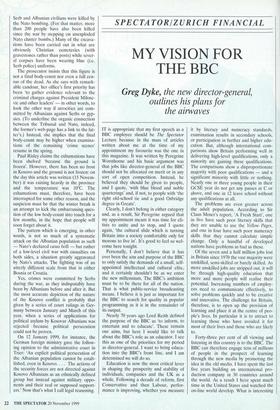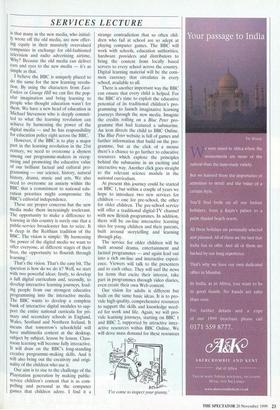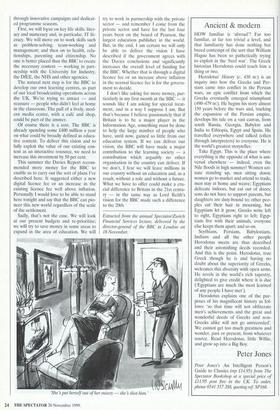SPECTATOR/ZURICH FINANCIAL
MY VISION FOR THE BBC
Greg Dyke, the new director-general, outlines his plans for the airwaves
IT is appropriate that my first speech as a BBC employee should be The Spectator Lecture because in the mass of articles written about me at the time of my appointment my favourite was the one in this magazine. It was written by Peregrine Worsthorne and his basic argument was that jobs like director-general of the BBC should not be allocated on merit or in any sort of open competition. Instead, he believed they should be given to people, and I quote, 'with blue blood and noble quarterings' and, if not, to people with 'the right old-school tie and a good Oxbridge degree in Greats'.
Clearly, I don't belong in either category and, as a result, Sir Peregrine argued that my appointment meant it was time for eli- tists to unite and to stop, and I quote again, 'the cultural slide which is turning Britain into a society comfortable only for morons to live in'. It's good to feel so wel- come here tonight.
Personally, I don't believe that it has ever been the aim and purpose of the BBC to only satisfy the demands of a small, self- appointed intellectual and cultural elite, and it certainly shouldn't be as we enter the new millennium. The BBC's ambition must be to be there for all of the nation. That is what public-service broadcasting means. I believe it is just as important for the BBC to search for quality in popular programming as it is in the remainder of its output.
Nearly 70 years ago Lord Reith defined the purpose of the BBC as `to inform, to entertain and to educate'. These remain our aims, but here I would like to talk about the BBC's role as an educator. I see this as one of the priorities for my period as director-general. I want to bring educa- tion into the BBC's front line, and I am determined we will do so.
Education is now the most critical lever in shaping the prosperity and stability of individuals, companies and the UK as a whole. Following a decade of reform, first Conservative and then Labour, perfor- mance is improving, whether you measure
it by literacy and numeracy standards, examination results in secondary schools, or participation in further and higher edu- cation. But, although international com- parisons show Britain performing well in delivering high-level qualifications, only a minority are gaining these qualifications. The comparisons show a disproportionate majority with poor qualifications — and a significant minority with little or nothing. Nearly one in three young people in their GCSE year do not get any passes at C or above, and one in 12 leave school without any qualifications at all.
The problems are even greater across the adult population. According to Sir Claus Moser's report, 'A Fresh Start', one in five have such poor literacy skills that they are unable to use the Yellow Pages, and one in four have such poor numeracy skills that they cannot calculate simple change. Only a handful of developed nations have problems as bad as these.
Of the seven and a half million jobs lost in Britain since 1970 the vast majority were unskilled, semi-skilled or barely skilled. As more unskilled jobs are stripped out, it will be through high-quality education that more and more people will realise their potential. Increasing numbers of employ- ees need to communicate effectively, to solve problems quickly and to be creative and innovative. The challenge for Britain, therefore, is to open up the provision of learning and place it at the centre of peo- ple's lives. In particular it is to attract to learning those who have avoided it for most of their lives and those who are likely to.
Forty-three per cent of all viewing and listening in this country is to the BBC. The BBC can therefore engage tens of millions of people in the prospect of learning through the new media by promoting the idea in the old media. I have spent the last five years building an international pro- duction company in 30 countries around the world. As a result I have spent much time in the United States and watched the on-line world develop. What is interesting
SERVICES LECTURE
is that many in the new media, who initial- ly wrote off the old media, are now offer- ing equity in their massively overvalued companies in exchange for old-fashioned television and radio advertising airtime. Why? Because the old media can deliver ears and eyes to the new media — it's as simple as that.
I believe the BBC is uniquely placed to do the same for the new learning revolu-
tion. By using the characters from East- Enders or Grange Hill we can fire the pop- ular imagination and bring learning to people who thought education wasn't for them. We have a new head of education in Michael Stevenson who is deeply commit- ted to what the learning revolution can achieve by harnessing the power of the digital media — and he has responsibility for education policy right across the BBC.
However, if the BBC is to play a major part in the learning revolution in the 21st century, we need to overcome a shyness among our programme-makers in recog- nising and promoting the educative value of our brilliant factual and cultural pro- gramming — our science, history, natural history, drama, music and arts. We also need to overcome an anxiety within the BBC that a commitment to national edu- cation priorities might compromise the BBC's editorial independence.
These are proper concerns but the new media make them increasingly irrelevant. The opportunity to make a difference to learning in this country is surely one that a public-service broadcaster has to seize. It is deep in the Reithian tradition of the BBC. The vision is simple: 'By harnessing the power of the digital media we want to offer everyone, at different stages of their lives, the opportunity to flourish through learning.'
That's the vision. That's the easy bit. The question is how do we do it? Well, we start with two powerful ideas: firstly, to develop a full digital curriculum and, secondly, to develop interactive learning journeys, lead- ing people from our strongest educative programming into the interactive media. The BBC wants to develop a complete bank of interactive digital modules to sup- port the entire national curricula for pri- mary and secondary schools in England, Wales, Scotland and Northern Ireland. It Means that tomorrow's schoolchild will have multimedia content at the desktop, subject by subject, lesson by lesson. Class- room learning will become fully interactive. It will draw on the BBC's long-standing creative programme-making skills. And it will also bring out the creativity and origi- nality of the children who use it.
Our aim is to rise to the challenge of the Playstation generation by making public- service children's content that is as com- pelling and personal as the computer games that children adore. I find it a strange contradiction that so often chil- dren who fail at school are so adept at playing computer games. The BBC will work with schools, education authorities, hardware providers and distributors to bring the content from locally based servers to every school across the country. Digital learning material will be the com- mon currency that circulates in every school, available to all.
There is another important way the BBC can ensure that every child is helped. For the BBC it's time to exploit the educative potential of its traditional children's pro- gramming to launch imaginative learning journeys through the new media. Imagine
the credits rolling on a Blue Peter pro- gramme that had featured a submarine.
An icon directs the child to BBC Online.
The Blue Peter website is full of games and further information that build on the pro-
gramme, but at the click of a mouse there's a chance to go further to educative resources which explore the principles behind the submarine in an exciting and interactive way. Another click goes straight to the relevant science module in the national curriculum.
At present this journey could be started on BBC 1, but within a couple of years we hope to introduce two new services for children — one for pre-school, the other for older children. The pre-school service will Offer a traditional digital-TV channel with new British programmes. In addition, there will be on-line interactive learning sites for young children and their parents, built around storytelling and learning through play.
The service for older children will be built around drama, entertainment and factual programmes — and again lead out into a rich on-line and interactive experi- ence. Viewers will talk to the presenters and to each other. They will surf the news for items that excite their interest, take part in programmes through video diaries, even create their own Web content.
Our vision for adults is different but built on the same basic ideas. It is to pro- vide high-quality, comprehensive resources to support the skills and knowledge need- ed for work and life. Again, we will pro- vide learning journeys, starting on BBC 1 and BBC 2, supported by attractive inter- active resources within BBC Online. We will drive mass demand for these resources 'I've come to inspect your granny.' through innovative campaigns and dedicat- ed programme seasons.
First, we will focus on key life skills: liter- acy and numeracy and, in particular, IT lit- eracy. We will move on to work skills such as problem-solving, team-working and management; and then on to health, rela- tionships, parenting and citizenship. No one is better placed than the BBC to create the necessary content — working in part- nership with the University for Industry, the DfEE, the NHS and other agencies. The natural next step is for the BBC to develop our own learning centres, as part of our local broadcasting operations across the UK. We're trying to attract — and reassure — people who didn't feel at home in the classroom. The pull of a lively, mod- ern media centre, with a cafe and shop, could be part of the answer.
Of course there is a cost. The BBC is already spending some £400 million a year on what could be broadly defined as educa- tive content. To deliver this vision and to fully exploit the value of our existing con- tent as an interactive resource, we need to increase this investment by 50 per cent.
This summer the Davies Report recom- mended more money for the BBC to enable us to carry out the sort of plans I've described here. It suggested either a new digital licence fee or an increase in the existing licence fee well above inflation. Personally I would love to be able to stand here tonight and say that the BBC can pio- neer this new world regardless of the scale of the settlement.
Sadly, that's not the case. We will look at our present budgets and re-prioritise; we will try to save money in some areas to expand in the area of education. We will
try to work in partnership with the private sector — and remember I come from the Private sector and have for the last four years been on the board of Pearson, the largest education publisher in the world. But, in the end, I am certain we will only be able to deliver the vision I have described if the government agrees with the Davies conclusions and significantly increases the overall level of funding for the BBC. Whether that is through a digital licence fee or an increase above inflation in the normal licence fee is for the govern- ment to decide.
I don't like asking for more money, par- ticularly in my first month at the BBC — it sounds like I am asking for special treat- ment, and in a way I suppose I am. But that's because I believe passionately that if Britain is to be a major player in the Information Age, something must be done to help the large number of people who have, until now, gained so little from our education system. If we can deliver our vision, the BBC will have made a major contribution to the learning society — a contribution which arguably no other organisation in the country can deliver. If we don't, I fear we will leave millions in our country without an education and, as a result, without a role and without a future. What we have to offer could make a cru- cial difference to Britain in the 21st centu- ry — in the same way as Lord Reith's vision for the BBC made such a difference to the 20th.
Extracted from the annual Spectator/Zurich Financial Services lecture, delivered by the director-general of the BBC in London on 18 November.
She's put herself out of her misery — she's shot him.'




























































































 Previous page
Previous page